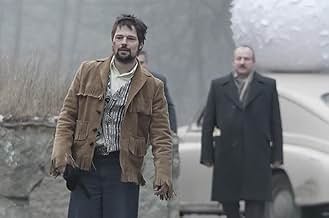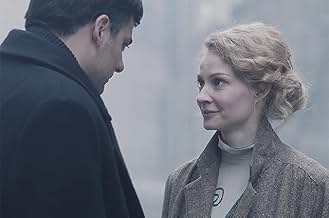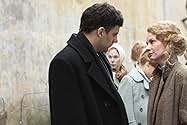Dovlatov
- 2018
- Tous publics
- 2h 6min
NOTE IMDb
6,4/10
2,3 k
MA NOTE
Ajouter une intrigue dans votre langueThe film actions unfold in 1971, telling about the four days of life of famous writer Sergei Dovlatov. The film raises the eternal issue of the Russian and European culture - the issue of mo... Tout lireThe film actions unfold in 1971, telling about the four days of life of famous writer Sergei Dovlatov. The film raises the eternal issue of the Russian and European culture - the issue of moral choice.The film actions unfold in 1971, telling about the four days of life of famous writer Sergei Dovlatov. The film raises the eternal issue of the Russian and European culture - the issue of moral choice.
- Réalisation
- Scénario
- Casting principal
- Récompenses
- 5 victoires et 11 nominations au total
Danila Kozlovsky
- David
- (as Danila Kozlovskiy)
Tamar Hovhannisyan
- Nora Dovlatova - Sergei Dovlatov mother
- (as Tamara Oganesyan)
Anna Yekaterininskaya
- Deputy director of the plant
- (as Anna Ekaterininskaya)
Sergei Tolstov
- Factory Newspaper Editor
- (as Sergey Tolstov)
Maria Järvenhelmi
- Finnish tourist
- (as Mari Yarvinkhelmi)
Nikolai Shatokhin
- Dovlatov's friend
- (as Nikolay Shatokhin)
Avis à la une
I have to admit I was shocked by the low quality of the acting. Most conversations (and in this movie there are plenty of those) seem really unnatural and awkward, most actors seem to recite their lines as if they were reading them from a paper... There is neither chemistry, connection nor emotion between the actors whatsoever: they seem to be talking past each other instead of to each other (maybe on some occasions it's deliberate, but this is happening throughout the whole movie, which makes it completely absurd.. ). Female characters have no importance on their own terms - they are only there to serve as background to the male characters. Weirdly, all females have bags under their eyes... Slight positives: the main character is mildly charismatic and the movie gives you a glimpse into how live could have been during the seventies in Russia (no idea if it's accurate enough). However, overall the movie is quite a waste of time, unfortunately.
One of the highlights of the 68th Berlin International Film Festival was the film Dovlatov, directed by Alexei German Jr.
Sergei Dovlatov is a rather well-known writer in Russia, but not so famous in the West, and is mostly associated with the circle of friends of Joseph Brodsky. Alexei German chose to depict only four days of Sergei Dovlatov's life in 1971. The film was a co-production between Russia, Poland and Serbia. The cinematographer was Lukasz Zal, known for his work on Oscar winner Ida.
The film is made in a non-hurried pace. What is depicted is the everyday life of a writer who unsuccessfully tries to get published, while working as a journalist. The first impression after watching this film is that the director intentionally exaggerated the misery of Soviet-era life. The scenery is too bleak and life is too poor, for example, later in his life Sergei Dovlatov wrote in a letter that his flat in St. Petersburg was better than his American flat. Also the depiction is not accurate. This concerns the small details such as styles of cars and important events described in the film. In particular, the episode with the officers of OBKhSS (Department Against Misappropriation of Socialist Property) chasing the poor artist, portrayed by Danila Kozlovsky, with red IDs is completely fantasy. First of all, OBKhSS was an organization which only investigated large-scale economical crimes and it was out of their jurisdiction to chase after petty criminals. Another segment with the suicide of an office worker does not have any factual basis concerning Dovlatov's real life or have anything to do with his writings. Also, neither Sergei Dovlatov's heavy drinking nor womanizing is shown in the film, as everyone else imbibes except him. Dovlatov tries to impose the point of view that the artists who were not union members were nothing. However, this is not true.
German obviously wanted to present Sergei Dovlatov as a victim of the Soviet regime. However, he was not a rebel or a non-conformist as for example Aleksander Solzhenitsyn. Dovlatov lived in Russia by it's rules and legally emigrated.. He worked as a journalist and wrote commissioned articles. Aleksander Solzhenitsyn was physically thrown out of the Soviet Union and stayed a non-conformist till the end of his life.
A person who did not live in the Soviet time and is not too familiar with the life there, after watching the film can receive a false impression of that period. At the press conference German defended modern Russia. Somehow his film illustrates the contrast between 1970s Soviet era and Putin's Russia, where, as German said there is no antisemitism, no censorship. However in Soviet times Russia was more rich with talents than today. I told Alexei German Jr. about this when we met in Berlin on the 18th of February 2018. There is no plot or dramatic conflict in the film and it is too long to hold the viewers attention. It is quite natural that a writer wants to get published, but 99% of the time it does not happen very quickly and does not have anything to do with Soviet reality. The question rises about the intentions of the film; perhaps for some people it is beneficial to represent Soviet Russia as a miserable and scary place with no creative freedom. At the press conference German spoke that spoke that some people and forces try to demonize Russia. While it is partially true, with this film he himself demonizes the Soviet Union and with it, inadvertently, modern Russia, because present-day Russia inherited a lot of the Soviet times.
Some of the positive aspects of the picture include the acting of Milan Maric, who is charismatic and creates an interesting character, however according to the testimonies of his many friends, the real Dovlatov was much more brutal and humoristic. The most vivid supporting role was by Danila Kozlovsky, who played the tragic role of an artist who earned money by selling goods on the black market. He did the best of his part, although the events happening to him are pure fantasy.
A.German tries to convince the audience that Dovlatov was not published because of that particular time of stagnation when talents were not appreciated and the arts were controlled by people who did not understand anything in it. It is interesting to compare the film with modern Russia, where there are a lot less of great writers and directors then in the period of stagnation, despite German saying that there is no censorship today. That Dovlatov considered himself to be a better poet than Yevtushenko is his own very personal opinion, which is very far from reality. Only time can prove if Dovlatov will continue to be a popular writer alongside the great writers of Russia. The fate of an artist or a poet is a difficult one in all countries, and many writers superior to Dovlatov experienced hardships with publishing their works.
The Soviet time is shown as shabby, hopeless and wretched, which is also blown out of proportion in the picture. At the press conference, German said that there is no censorship or anti-Semitism today in Russia. But in reality, the time of the 1960-1970s bore the peaks of Russian creativity in all fields of art. All the best writers, poets, ballet dancers, directors, all of them worked in the 1960-1970s, including Alexei German Sr., without whom there would be no Alexei Alexeevich German. Lack of open censorship does not equal the flourishing of arts.
I was surprised that he tried to make a hero out of Sergei Dovlatov for his immigration. He immigrated legally and nothing threatened him. I compared the emigration of Nureyev, who was given a seven year sentence for betrayal of homeland. On the other hand, Dovlatov peacefully followed his wife and child. If he had not become an alcoholic, he would have been alive during the Perestroika and could have returned to Russia as Edouard Limonov did. Because of this the film lacks drama, despite German's attempts of creating tragedy with fictional characters where there is none.
Alexei German Jr., has a great cast in the film, which includes newcomer Milan Maric, and also well-known actors Danila Kozlovsky, Svetlana Khodchenkova and Elena Lyadova. However, their parts are quite weak, in spite of the big potential of their actors. Kozlovsky, is especially unlucky lately with his roles - in the film Matilda he played the villain who was kept in an aquarium and later burned alive, the role was completely senseless and stupid. In the film Dovlatov, Danila Kozlovsky did his best, but his role was also absurd. Elena Lyadova had a completely insignificant part despite her great acting talent.
Overall Dovlatov is a mediocre film about a mediocre writer for a mediocre audience.
Sergei Dovlatov is a rather well-known writer in Russia, but not so famous in the West, and is mostly associated with the circle of friends of Joseph Brodsky. Alexei German chose to depict only four days of Sergei Dovlatov's life in 1971. The film was a co-production between Russia, Poland and Serbia. The cinematographer was Lukasz Zal, known for his work on Oscar winner Ida.
The film is made in a non-hurried pace. What is depicted is the everyday life of a writer who unsuccessfully tries to get published, while working as a journalist. The first impression after watching this film is that the director intentionally exaggerated the misery of Soviet-era life. The scenery is too bleak and life is too poor, for example, later in his life Sergei Dovlatov wrote in a letter that his flat in St. Petersburg was better than his American flat. Also the depiction is not accurate. This concerns the small details such as styles of cars and important events described in the film. In particular, the episode with the officers of OBKhSS (Department Against Misappropriation of Socialist Property) chasing the poor artist, portrayed by Danila Kozlovsky, with red IDs is completely fantasy. First of all, OBKhSS was an organization which only investigated large-scale economical crimes and it was out of their jurisdiction to chase after petty criminals. Another segment with the suicide of an office worker does not have any factual basis concerning Dovlatov's real life or have anything to do with his writings. Also, neither Sergei Dovlatov's heavy drinking nor womanizing is shown in the film, as everyone else imbibes except him. Dovlatov tries to impose the point of view that the artists who were not union members were nothing. However, this is not true.
German obviously wanted to present Sergei Dovlatov as a victim of the Soviet regime. However, he was not a rebel or a non-conformist as for example Aleksander Solzhenitsyn. Dovlatov lived in Russia by it's rules and legally emigrated.. He worked as a journalist and wrote commissioned articles. Aleksander Solzhenitsyn was physically thrown out of the Soviet Union and stayed a non-conformist till the end of his life.
A person who did not live in the Soviet time and is not too familiar with the life there, after watching the film can receive a false impression of that period. At the press conference German defended modern Russia. Somehow his film illustrates the contrast between 1970s Soviet era and Putin's Russia, where, as German said there is no antisemitism, no censorship. However in Soviet times Russia was more rich with talents than today. I told Alexei German Jr. about this when we met in Berlin on the 18th of February 2018. There is no plot or dramatic conflict in the film and it is too long to hold the viewers attention. It is quite natural that a writer wants to get published, but 99% of the time it does not happen very quickly and does not have anything to do with Soviet reality. The question rises about the intentions of the film; perhaps for some people it is beneficial to represent Soviet Russia as a miserable and scary place with no creative freedom. At the press conference German spoke that spoke that some people and forces try to demonize Russia. While it is partially true, with this film he himself demonizes the Soviet Union and with it, inadvertently, modern Russia, because present-day Russia inherited a lot of the Soviet times.
Some of the positive aspects of the picture include the acting of Milan Maric, who is charismatic and creates an interesting character, however according to the testimonies of his many friends, the real Dovlatov was much more brutal and humoristic. The most vivid supporting role was by Danila Kozlovsky, who played the tragic role of an artist who earned money by selling goods on the black market. He did the best of his part, although the events happening to him are pure fantasy.
A.German tries to convince the audience that Dovlatov was not published because of that particular time of stagnation when talents were not appreciated and the arts were controlled by people who did not understand anything in it. It is interesting to compare the film with modern Russia, where there are a lot less of great writers and directors then in the period of stagnation, despite German saying that there is no censorship today. That Dovlatov considered himself to be a better poet than Yevtushenko is his own very personal opinion, which is very far from reality. Only time can prove if Dovlatov will continue to be a popular writer alongside the great writers of Russia. The fate of an artist or a poet is a difficult one in all countries, and many writers superior to Dovlatov experienced hardships with publishing their works.
The Soviet time is shown as shabby, hopeless and wretched, which is also blown out of proportion in the picture. At the press conference, German said that there is no censorship or anti-Semitism today in Russia. But in reality, the time of the 1960-1970s bore the peaks of Russian creativity in all fields of art. All the best writers, poets, ballet dancers, directors, all of them worked in the 1960-1970s, including Alexei German Sr., without whom there would be no Alexei Alexeevich German. Lack of open censorship does not equal the flourishing of arts.
I was surprised that he tried to make a hero out of Sergei Dovlatov for his immigration. He immigrated legally and nothing threatened him. I compared the emigration of Nureyev, who was given a seven year sentence for betrayal of homeland. On the other hand, Dovlatov peacefully followed his wife and child. If he had not become an alcoholic, he would have been alive during the Perestroika and could have returned to Russia as Edouard Limonov did. Because of this the film lacks drama, despite German's attempts of creating tragedy with fictional characters where there is none.
Alexei German Jr., has a great cast in the film, which includes newcomer Milan Maric, and also well-known actors Danila Kozlovsky, Svetlana Khodchenkova and Elena Lyadova. However, their parts are quite weak, in spite of the big potential of their actors. Kozlovsky, is especially unlucky lately with his roles - in the film Matilda he played the villain who was kept in an aquarium and later burned alive, the role was completely senseless and stupid. In the film Dovlatov, Danila Kozlovsky did his best, but his role was also absurd. Elena Lyadova had a completely insignificant part despite her great acting talent.
Overall Dovlatov is a mediocre film about a mediocre writer for a mediocre audience.
10gokselll
What a good movie!!!
In this movie audience witnesses a week of Russian author Dovlatov's life. Panoramic view of those seven days shows interesting details of everyday lives of intellectuals and artists in the late period of USSR.
Within a plain but masterfully designed visual composition, with no agitative langue, the movie presents satirical sub-texts on pressure of state-bureaucratic principles on artistic production, degeneration of USSR administrative regime and confliction of factual-economical position of artist in life and existential and inherent artistic motivation etc...
Critics on state-art relation in this movie not only satire historical conditions in USSR but also compose a general and actual critical sense on relevant matters indicating negative picture of the ideal conditions.
Watching "Dovlatov" is a great cinematic pleasure, a great experience!
In this movie audience witnesses a week of Russian author Dovlatov's life. Panoramic view of those seven days shows interesting details of everyday lives of intellectuals and artists in the late period of USSR.
Within a plain but masterfully designed visual composition, with no agitative langue, the movie presents satirical sub-texts on pressure of state-bureaucratic principles on artistic production, degeneration of USSR administrative regime and confliction of factual-economical position of artist in life and existential and inherent artistic motivation etc...
Critics on state-art relation in this movie not only satire historical conditions in USSR but also compose a general and actual critical sense on relevant matters indicating negative picture of the ideal conditions.
Watching "Dovlatov" is a great cinematic pleasure, a great experience!
In Soviet times, no one needed talent. Mediocrity ruled the ball, with talented people suppressed, gifted ones even harder - having been afraid of, like a primeval creature is scared and therefore responds aggressively to anything inexplicable. Those talented, having no way of expression, finding no audience, reading audience first of all, would fall into nothingness unless fled abroad or drowned in vodka. This was consistent and gave no chances to artists in developing anything worth reading. But the talent was nonetheless stronger and many infiltrated the history of literature. What Soviet leaders promulgated was easily captured locally, in chief editor's offices, writers' union, even by sellers of forbidden books trembling for their lives and freedom. Total ignorance, straightforwardness, and ultimate desire to crush any individuality made its way to exterminating any roots of artistic calling that has been so strong in the Russian literature before Soviets. That's when the genocide started whose fruits we have along, with the post-Soviet ravenous lust for money having superimposed and inflicted the last strike.
Across the ocean, the world saw beatniks to be the last whose nervous, preagonic howl loomed over the world of big literature, eventually resulting in poor language and rhetoric of late post-modernism with its too much relying on commercialization and losing the essence. What we have now is the outcome of how polar types of societies evolved to squeeze profound art from both sides leaving no place for genius looking for an exit of its artistic power. These days, there is no room to even write a word unless it brings profits to the publisher.
Both Soviet masses and elites were not ready to new trends having no desire to read about trifles rather than something big. Leaving general all-humanity topics for small things was a border between modernism and post-modernism and was for sure better perceived in developed countries rather than those built by narrow thinking of power-holding minorities. Brodsky finally left for the US to be honored a Noble prize, which may be argued about as a politically motivated act, but no one doubted his talents except for those who were afraid that his literary actions may rock the boat of stable way to a better future (which we may very well observe now as well, huh). Whether they did understand that their work is used for political games in this new world, that we don't know, but what we got in the end is a collapse of literature as we, or previous generations, knew it. Through years of struggle, true art has lost its positions and we'll never see it as before again, with the last man of letters having perished at the turn of the century.
As for Dovlatov, Ernst Neschastny once wrote: "He was drinking as hell, drowning himself in alcohol, as generations of Russian men before him - dark Russian alcoholism with the only purpose of slowly killing themselves, reaching the end they were seeking so much, trying to elude the reality they couldn't fix or live in." This is what we don't see in the film, but what we should know. Being unacknowledged throughout his life and finding glory only after his death, Dovlatov remains an image of how the system mutilates fates and lives. Those who he called "low and pathetic people" were the one responsible for their country and its future that we have now. They are to be blamed for narrow-mindedness, vanity, stupidity, thirst for power, and personal ambitions. After all these years, we still see it in federation-level decision makers.
The closing scene is of course the most important one showing how hard it is, emotionally, socially, and physically, to overcome the pressures coming both from inside and outside and follow your way. "Don't listen to no one, your books are your business. It's going to be hard but you will find inner power" sounds like parting words to every artist in doubt. And being such, Dovlatov makes a final line concluding his existence and, perhaps, alluding, in part, to any human's life: "Still we exist, always drinking, in worn out shoes, poor, and sometimes talented. We still exist. We are and we will be. The only way not to lose yourself is to go through that thorny way of hopes, disappointments, and losses. "
Dovlatov is a good biographical film about a famous Russian writer. The majority of biographical films are divided into 2 types: either the film tells the whole life of a person or in detail about some period of life. It is type 2 that I consider preferable, as in 2-2.5 hours of conditional timing it is difficult to lay down a whole life of a person. Dovlatov is just such a film, the action of the film unfolds in just a couple of days 1971. Transfer of an era, life and life of Leningrad of the 1970th years simply 10/10. One of the best films about the period of Brezhnev stagnation of society. Just a good film, in which there are only dialogues and internal conflict of the writer, who alone opposes the state structure.
Le saviez-vous
- ConnexionsFeatures Romantyczni (1970)
Meilleurs choix
Connectez-vous pour évaluer et suivre la liste de favoris afin de recevoir des recommandations personnalisées
- How long is Dovlatov?Alimenté par Alexa
Détails
- Date de sortie
- Pays d’origine
- Sites officiels
- Langues
- Aussi connu sous le nom de
- 文字慾
- Lieux de tournage
- Sociétés de production
- Voir plus de crédits d'entreprise sur IMDbPro
Box-office
- Montant brut mondial
- 2 187 653 $US
- Durée2 heures 6 minutes
Contribuer à cette page
Suggérer une modification ou ajouter du contenu manquant

![Regarder Trailer [OVS]](https://m.media-amazon.com/images/M/MV5BZjQ0ODcwYTMtZmU2OC00ZDFlLTkyZTgtY2Y0NDFjMjJmNmZlXkEyXkFqcGdeQXRyYW5zY29kZS13b3JrZmxvdw@@._V1_QL75_UX500_CR0)






























